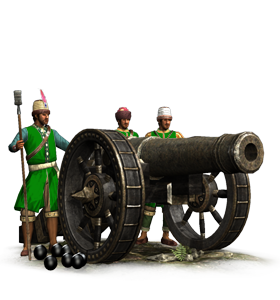Difference between revisions of "64-lber Heavy Artillery (ETW Unit)"
Tango12345 (talk | contribs) (→Tactics) |
Shackleton (talk | contribs) |
||
| Line 1: | Line 1: | ||
| − | {{Unit|image=[[ | + | {{TW Unit|image=[[Image:64 pdr etw.png]] |
| + | |Class=Fixed Artillery | ||
| + | |Unit Size=24 men | ||
| + | |Weaponry=64 pdr cannon | ||
| + | |Region=Global | ||
| + | |Recruitment Cost=950 | ||
| + | |Upkeep Cost=230 | ||
| + | |Building Requirements=Military Engineer School | ||
| + | |Tech Requirements=None | ||
| + | |Attributes=<li>Resistant to Heat Fatigue</li> <li>Can Hide in Woodland</li> | ||
| + | }} | ||
| + | |||
[[Image:64_lber_fixed.png]]These enormous cannons can pound enemies to pieces in very short order. Their size and weight makes them almost immobile once emplaced. | [[Image:64_lber_fixed.png]]These enormous cannons can pound enemies to pieces in very short order. Their size and weight makes them almost immobile once emplaced. | ||
| Line 8: | Line 19: | ||
==Details== | ==Details== | ||
| − | These weapons have very large amounts of firepower, as one might expect considering the size. They also have the benefit of a longer range than the 24 | + | These weapons have very large amounts of firepower, as one might expect considering the size. They also have the benefit of a longer range than the 24-pounder weapons available to most other armies. This makes them especially useful for battering down walls in sieges and thinning the ranks of numerous tightly packed enemy formations. However, they are very expensive to recruit and maintain and are also immobile on the battlefield. As such, they should be used only where they have a good firing position and can be easily defended, and of course only if one can manage the costs associated with them. |
==Factions== | ==Factions== | ||
Revision as of 14:27, 6 January 2013
 These enormous cannons can pound enemies to pieces in very short order. Their size and weight makes them almost immobile once emplaced.
These enormous cannons can pound enemies to pieces in very short order. Their size and weight makes them almost immobile once emplaced.
Overview
As the name suggests, these huge guns fire cannon balls in excess of 60 pounds. The impact of such a shot crushes anyone unlucky enough to be caught, and does terrible damage to any structure hit. That canister shot can be added on top of such a ball is merely piling on the misery for the unfortunate targets. These enormous guns require large-scale support to operate effectively. Indeed, in Indian service they are often towed by elephants rather than a team of smaller draught oxen!
Historically, guns this size were difficult to cast without flaws; the size of gunpowder charge involved in firing these guns meant that any flaw would be fatal to the gunners. Secondly, there was the difficulty of moving these guns to the battlefield. Smaller artillery produced substantial trains of draught animals, additional carts for powder, spares and shot, (all with more draught animals) – and then all of these would need feeding and watering, even before the gun crews were considered. That it was considered worthwhile to produce and then use these guns with all these drawbacks shows just how destructive they were.
Details
These weapons have very large amounts of firepower, as one might expect considering the size. They also have the benefit of a longer range than the 24-pounder weapons available to most other armies. This makes them especially useful for battering down walls in sieges and thinning the ranks of numerous tightly packed enemy formations. However, they are very expensive to recruit and maintain and are also immobile on the battlefield. As such, they should be used only where they have a good firing position and can be easily defended, and of course only if one can manage the costs associated with them.
